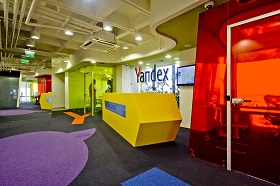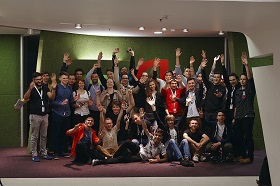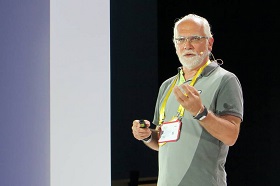Better than a “Global Player”. Interview with Yandex Product Marketing Director
In
Login if you are already registered
(no votes) |
(0 votes) |
In times of economic crisis many people emphasize the necessity of diversifying the Russian economy and stimulating the development of advanced technologies. Director of Product Marketing at Yandex Andrey Sebrant have discussed with RIAC international activities of the company, principles of working abroad and the research intensity of the Russian economy.
In times of economic crisis many people emphasize the necessity of diversifying the Russian economy and stimulating the development of advanced technologies. Director of Product Marketing at Yandex Andrey Sebrant has discussed with RIAC international activities of the company, principles of working abroad and the research intensity of the Russian economy.
Yandex is a global company. How does it reflect on its personnel structure? Do you currently have expats on the staff of the Russian office?
First of all, we do not prefer the term “global.” Yandex is different from global companies that make one product for many markets, and then decorate them with local features. We try to develop our products step by step. Arkady Volozh calls this approach “translocal:” we use the same technology as Western companies do, but recognize the importance of paying due service to Russian culture and language. For example, we know that the fixed-route, mini-bus service is important for citizens who use public transport. Therefore, when developing the mobile application Yandex.Transport, we had to incorporate data about mini-bus routes. Local knowledge allows us to improve our service more than that a global player could, since the latter comes in and, roughly speaking, only is aware of buses, because there are buses in all countries. So, I wouldn’t use the word “global” when speaking of Yandex. As for expats, of the three and a half thousand employees in our office in Moscow, less that a dozen people come to mind straight off.
How do you staff your representative offices abroad?
Here, we make use of the locality principle to the full extent. For example, in Ukraine or Belarus, we have large development offices, which create root technologies not only for these two countries. In Belarus, we might use special technologies to offer information to local users, but the search technology itself is universal. Such offices are staffed by residents of Russia and Belarus. However, the situation is different with the staff of local offices, which are responsible for products in that country, for its placement and marketing. These employees are always residents of that particular country. So, the Turkish office, of course, is manned by Turks – they understand the market, define the product requirements for Turkey, and interact with the development teams from other countries, as certain products for Turkey might have been created in Belarus, Russia or Ukraine.
International political events often affect the performance of multi-national teams. Have the political tensions caused by the Ukrainian crisis had a negative impact on the performance of the company’s staff?
The company’s corporate culture does not allow people to mix business with personal matters. I consider political views to be personal matters.
Fortunately, in terms of internal processes, there has not been such impact: the company’s corporate culture does not allow people to mix business with personal matters. I consider political views to be personal matters.
Not so long ago Yandex opened its representative office in China. What is the mission of the Company in that country?
If a country has no school of thought, an isolated scientist cannot survive: he has to communicate with colleagues of a similar level, and not once a year at a conference, but every day – in the corridor, at the next desk, over lunch. He should attend seminars and meet people from other companies and institutions, and not necessarily from other countries.
Our office in China serves as a sales office, because, apart from providing free services, Yandex sells advertising that covers virtually the whole Russian audience. We have a similar sales office in Switzerland that works on Europe. Companies with headquarters in Europe want more than just to place orders online; they want to come and discuss issues without having to travel to Moscow. Given that China is becoming an important partner of Russia, it is not surprising that more and more Chinese companies are taking an interest in advertising on the Russian market. They understand that advertising does not exist without the Internet, understand the position of Yandex in the Russian Internet and want to buy our advertising services. They also prefer to conduct negotiations in Chinese and in China, rather than correspond with the Moscow office or have to fly to Moscow.
China's Internet is quite isolated: China has its own web search engine, its own social networks, etc. Is Yandex planning to offer its services to the Chinese?
We don’t really like to talk about our plans.
On October, 22 at a meeting of BRICS IT-ministers head of Yandex Arkady Volozh declared that Yandex was ready to hit BRICS countries' markets
What is the purpose of Yandex educational projects? Are they a primary focus of the company?
Yandex educational projects, with some exceptions, are aimed at three audiences.

Yandex's New Istanbul Office
It’s perfectly natural to treat the information that people have entrusted to you and don’t want to see disclosed in any way, with the utmost responsibility.
The first audience is the talent that we want one day to invite to work, so that our employees could communicate with their own kind. Yandex is a high-tech company, and the requirements for running any knowledge-intensive production are the same as for big science. Mind you that half of Russia’s production capacity fell apart exactly for this particular reason. If a country has no school of thought, an isolated scientist cannot survive: he has to communicate with colleagues of a similar level, and not once a year at a conference, but every day – in the corridor, at the next desk, over lunch. He should attend seminars and meet people from other companies and institutions, and not necessarily from other countries.
This is a necessary condition for any effective, competitive big science. If we fail to cultivate such a community within the country, there will be no skilled personnel to staff, but the specialists that we do so far have will also leave, because of a lack of interactions and communication. The task of HR managers is not just to train and hire a certain number of applicants, but to make sure that they stay here, in Russia. Our first educational initiative is aimed at the most advanced training programs. The most striking example is the Yandex School of Data Analysis, the purpose of which is to support online mathematics in Russia in general, and in Yandex in particular. If this dies in the country, it will fall into decline in Yandex too. Educational programs help us to remain competitive.
People constantly assess sites by their actions. There is little doubt that if a person after the search visited some site and never returned to that search query, he did find what he wanted. Thus, he has voted in favor of the fact that this site offers the information you need.
The second group of Yandex educational projects is aimed at our customers. The product that we sell, advertising on the Internet, is high-tech and ever-changing; there are no textbooks on it yet and you can’t study it in universities due to the appalling obsolescence of our entire system of higher education, especially in the field of marketing.
When creating a product, we build on hundreds of thousands of advertisers, so it makes no sense to train people to work with specific lists of partners within the framework of separate courses. Unlike television, where dozens of major advertisers provide the bulk of the budget, we build on very broad strata of small and medium-sized businesses. A case in point is the hundreds of thousands of companies that in one way or another are buying advertising at Yandex. The success of their businesses and of ours too depends on how well they know our tools. So, we require educated customers, as ignorant clients might buy something that does not delver expectations, become upset and never come to us again.
We use a lot of factors that are not always expressed by the stars on the fuselage. Rating everything in the world is one of the main Yandex activities.
Finally, the third educational project concerns an ecosystem of people, without which no service can survive. An excellent technical embodiment of this is API, the open Application Programming Interface. Not every site can create such a complex search engine that Yandex or Google provides. For example, a site that has a map with locations on a separate page should ideally provide directions to this, but it will not be able to develop its own mapping program. This is a tough technological challenge. A conventional store’s webmaster cannot create a mapping application. For almost all of our services, we provide interfaces that can be used by the directors of startups or corporate decisions. They make use of our technology, which is not available to companies of a smaller scale. But we have to teach all of these people how to utilize these services, so that they understand what to expect, what to ask, what to negotiate with Yandex about and how to deal aptly with what Yandex provides. Under the ecosystem in this case I mean a very broad class of programmers, webmasters, developers and other experts.
In terms of collecting, processing and storing data on the private lives of millions of people, Yandex is second to none in Russia. How do you assess this treasure – as a responsibility, as a heavy burden or as a unique opportunity? Does Yandex carry out research projects using this data array?

Yandex Design School
Of course, we feel a responsibility to all the people who work with us and entrust their personal data to us. The term “user data” has appeared recently, while we began our e-mail service about fifteen years ago. At that time there were no laws on the protection of personal data, but it’s perfectly natural to treat the information that people have entrusted to you and don’t want to see disclosed in any way, with the utmost responsibility.
As for research projects, I wouldn’t say that there are any. Such research projects would have been possible in collaboration with sociologists or economists. But, regrettably, I have to confess that sociologists as well as economists have no idea about the amount of data that Yandex has at its disposal. We were ready to cooperate with external research institutes, but they, unfortunately, turned out to be so imperceptive that it has proven impossible.
What is the role of ratings for Yandex?
In fact, any form of ranking is a rating. When a user asks us (Yandex) a question, we are trying to give search results of sites’ locations that have already been rated in accordance with the interest they might catch of an individual, which is defined by an algorithm.
As insolent as it may sound, but in reality, there is nothing we can learn in Europe. Yandex is the largest Internet company in Europe, while the second largest is called Mail.Ru, which is located near Airport metro station in Moscow.
Almost any search query suggests grabbing not just one answer, but a list of them that we have to somehow organize. Accordingly, the rating of an answer is reflected not by the number of stars as is the case with hotels, but by its place on the list. One site gets first place, another – tenth place, while certain sites are put on the fifth page.
Our algorithms are continuously rating everything: sites – in response to a specific question, goods – in response to a search for something on the Market, even cars that will come if called through the Taxi application. Therefore, the logic of rating per se is an integral part of almost every product of Yandex.
We can compete, and by “us,” I mean not just Yandex, but Mail.Ru and Pavel Durov’s instant messaging system Telegram. We’re OK when it comes to brains, but as to the ease of doing business in Russia, I would rather withhold any comments.
People constantly assess sites by their actions. There is little doubt that if a person after the search visited some site and never returned to that search query, he did find what he wanted. Thus, he has voted in favor of the fact that this site offers the information you need.
Sometimes a person clicks on the link, then returns back and immediately jumps to the next link, thinking: “This is probably not the thing I was looking for.” However, there may be another user who is interested in that particular piece of information. The professional term for this is “click factors,” that is, factors of users’ clicks for search results and of their behavior. This is one of the factors that, strictly speaking, represent a kind of popular vote for sites. And these users’ factors, linking, for example, the credibility of publications with their citation index in other sources, total in the hundreds.
Our ratings are different from simple expert ones when people get together and carry out assessments, although sometimes we have these too. For example, we do take users’ ratings into account in the analysis of works of art (music, movies, etc.) and in the rankings of cafes and restaurants. We do not give preference to an explicit assessment, when a person puts a number of stars, as this is often impulsive. It is well known that people often give either a good or a bad grade just because they don’t take the trouble to think it over. Take one’s actions on social networks: clicking the “like” or “dislike” button is impulsive. However, there are rare exceptions. For example, in the KinoPoisk, people seriously ponder over giving three or four stars.
That is why we prefer implicit actions, the examples of which I have already given: a user read a page for a long time or just closed it in shock and went to another page. The implicit vote says much more than clicking the “like” button. We use a lot of factors that are not always expressed by the stars on the fuselage. Rating everything in the world is one of the main Yandex activities.
Are there opportunities to increase the share of information and communication technology in Russian exports?
In our schools, at seminars and conferences we see a lot of exceptionally talented people by world standards. We can say so with certainty, since the majority of prominent Yandex employees attend major international conferences in Europe and America. As insolent as it may sound, but in reality, there is nothing we can learn in Europe. Yandex is the largest Internet company in Europe, while the second largest is called Mail.Ru, which is located near Airport metro station in Moscow. Other Europe is a scorched earth: at some point, US Internet companies either bought or dislodged from the market everything that existed in Europe. If we talk about Europe's largest Internet services (it makes no sense to speak of European Google or European Amazon in this context), there is only the Opera Browser, which is already smaller than the Yandex Browser. Yes, in Europe there are several start-ups, but they are nowhere near the great landscape of the country with its national search engine, national social network, our VKontakte, and its powerful e-commerce. In Russia, no one would die if something suddenly happened to Amazon or to eBay.
Our experience in Turkey shows that, having come to a country where people just knew Google, we managed to win about 7 percent of the desktop market and continue to develop. This example is a clear test of competitiveness. We can compete, and by “us,” I mean not just Yandex, but Mail.Ru and Pavel Durov’s instant messaging system Telegram. We’re OK when it comes to brains, but as to the ease of doing business in Russia, I would rather withhold any comments.
Interview by Maria Smekalova, RIAC website editor.
(no votes) |
(0 votes) |





